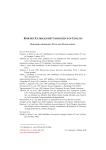Статьи. Рубрика в журнале - Schole. Философское антиковедение и классическая традиция
![Etymology of the nickname 'Iskarit(h): the “one who saw a sign” [('I)sqar(^i)'^o/yisqar(^i)'^o] or the “one who slandered/betrayed a sign” [('I)sqar(^i)'^o/yisqar(^i)'^o]? Etymology of the nickname 'Iskarit(h): the “one who saw a sign” [('I)sqar(^i)'^o/yisqar(^i)'^o] or the “one who slandered/betrayed a sign” [('I)sqar(^i)'^o/yisqar(^i)'^o]?](/file/thumb/147103397/etymology-of-the-nickname-iskarit-hthe-one-who-saw-a-sign-i-sqar-i.png)
Статья научная
The article derives Judas's nickname 'Iskariṓt(h) from the Hebrew/Aramaic verb sāqar/seqar, and the noun 'ōṯ/'ôṯ (widely used in Biblical Hebrew and attested in the Talmud [=Aramaic 't/'t']), and interprets it as the “one who saw/gaze upon a sign” (cf., e.g., John 2:23, 4:48, 6:2,14,30 mentioning those who «saw signs» and came to be Jesus's followers; the verbs theōréō and ‘oráō used in these passages correlate with the verb sāqar/seqar, “to look (at), gaze, see”, and the noun sēmeîon (pl. sēmeîa) correlates with the term 'ōṯ/'ôṯ, “sign”). The ex hypothesi “positive” character of Judas's nickname possibly explains the evangelists' renunciation of its interpretation. As an alternative etymology of Judas's nickname 'Iskariṓt(h), one can derive it from the Hebrew/Aramaic verb šāqar/šeqar (“to lie, deceive, slander”, sc. “to violate (a treaty, etc.)”, “to betray” [the latter meaning is attested in Samaritan Aramaic]) and the same noun 'ōṯ/'ôṯ: the “one who slandered/resp. betrayed a sign”, i.e. the one who brought false evidence against Jesus (сf.: Matt. 26:59 ff.; Mk. 14:55 ff.). In Jn. 6:70, Jesus himself defines Judas with the term diábolos; this word can be interpreted as “slanderer”, “accuser”.
Бесплатно
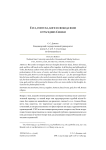
Fata, Fortuna, боги и свобода воли в трагедиях Сенеки
Статья научная
В данной статье исследуются взгляды Сенеки на судьбу (фата), удачу (фортуна), богов и свободу воли на основе анализа его трагедий. Во всех своих пьесах и философских трудах этот римский автор пишет о силе фаты, фортуны и богов, о предопределении хода событий и о необходимости проявлять смирение и почитать богов. Однако в трагедиях, написанных в 40-50-х годах, персонажи винят в своих несчастьях фату, фортуну и богов, которые способны испытывать эмоции (ненависть, гнев, раздражение) и причинять вред смертным. Это противоречит стоическим взглядам Сенеки. Идеи о фате, фортуне, богах и свободе воли, представленные в драмах 60-х годов, больше похожи на его мысли, изложенные в философских трудах.
Бесплатно

Federico Fellini and Homer: Parallels and intersections
Статья научная
This essay is an outgrowth of the topic considered in the previous articles devoted to the image of ancient and modern Rome in Federico Fellini’s films, in which an attempt to analyse several Homeric motifs in Fellini Satyricon (1969) was made. The Italian film director acknowledged that he had dreamed to make a film based on the European ‘Book of the Books’, Homer’s duology – the Iliad and the Odyssey – about the heroes of the Trojan cycle of myths. Other coincidences in Fellini and Homer constitute the object of this study. Deliberate? Fortuitous? Archetypic? Fanciful? The very wording of the topic – Fellini Satyricon as Fellini’s Iliad – is provocative. The article identifies and discusses the parallels and intersections in the works of the two great masters – the Ancient Greek poet and the classic of Italian cinematograph, who lived almost three millennia apart.
Бесплатно
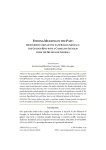
Статья научная
This paper offers a novel interpretation of the luxury golden ring with a carnelian intaglio depicting a woman's profile and an engraved Greek inscription, ΒΑCIΛICCΑ ΟΥΛΠIAΝΑ(Ζ)IA (or AΣIA E.A.), found in cist grave 14, in Mtskheta, Georgia, dated to the Roman period, the 3rd century AD. In consideration of the then contemporary political situation in the Mediterranean and Roman East, through the putting and interpreting sources into broad historical context, the author identifies the female individual as the Roman Empress Ulpia Severina. The very inclusion of royal woman within public propaganda during this period signifies her prominence within, and significance outside of, the imperial metropolis. This deliberate inclusion proved to the public that this empress was not mere figurehead but could have been a very influential person in the Empire.
Бесплатно
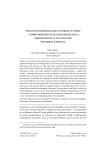
Статья научная
L'auteur de l'article tente de relier l'observation des relations économiques et commerciales développées par les Phéniciens dans la partie occidentale de la Méditerranée à une réflexion sur la situation dans laquelle se trouvaient les pays du Levant. On sait qu'à l'époque où la fondation de Carthage peut être hypothétiquement localisée, les centres phéniciens étaient sous pression politique, économique et militaire - principalement de l'Assyrie - bien que d'autres puissances, comme Damas, ne puissent être exclues. D'autre part, cependant, on sait que, par exemple, dans la science allemande l'absence d'acte fondateur de Carthage en Afrique du Nord a été soulignée, et les traces archéologiques laissées sur ce territoire semblent insuffisantes pour concilier les relations littéraires conventionnelles avec l'acte fondateur. de Carthage à la fin du IXe siècle av. L'intention de cet article est de tenter de montrer les enjeux à partir desquels il convient d'envisager la réinterprétation des événements rapportés dans le contexte de la fondation de Carthage. Cette démarche servirait à réviser les connaissances scientifiques existantes sur la chronologie de la fondation de Qarthadasht et pourrait, par conséquent, contribuer à montrer que la fondation de Carthage s'inscrit dans une période postérieure - c'est-à-dire la fin du VIIIe ou le début du VIIe. siècle avant notre ère.
Бесплатно
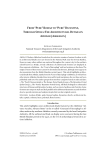
Статья научная
Modern Ashkelon, founded on the extensive remains of ancient Ascalon, is rich in architectural details; most are focused in the National Park near the Severan Basilica. However, many other artifacts are scattered throughout the current city. In the northern suburb known as Afridar, several collections of architectural elements are displayed at three open-air exhibitions—the “Court of Sarcophagi” and two locations on the shore. The origins of most of these items cannot be determined at this time, although some appear in documentation from the British Mandate period (1930s). This article highlights architectural details from Afridar, mainly from the “Court of Sarcophagi” exhibition, as well as from other sites in Ashkelon. Besides three items with Greek inscriptions, the rest have not been published until now. The author groups them into four categories based on style and date: 1. The “Purely” Roman details; 2. The Roman-Period Spolia Group; 3. The Byzantine-Period Spolia Group; 4. The “Purely” Byzantine-Period Group. All likely belonged to colonnaded structures of Roman and Byzantine Ascalon, such as streets, basilicas, and churches. Some elements are unique in style and lack parallels in local Roman-Byzantine art, and therefore deserve special attention and analysis despite their unclear original context.
Бесплатно
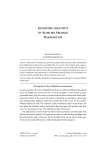
Geometric creativity of Ajami ibn Abubakr Nakhchivani
Статья научная
This article examines the geometric patterns that decorate three mausoleums from Nakhchivan, built in the second half of the 12th century. The architect of two mausoleums was Ajami ibn Abubakr, and the third mausoleum was also built either by him or by someone from his school. Among these patterns are simple and well-known ones, as well as complicated and original ones, undoubtedly invented by him. For each pattern, its structure and the possible idea of its invention are discussed.
Бесплатно
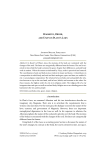
Harmony, order, and unity in Plato’s Laws
Статья научная
In Book X of Plato’s Laws , the motions of the body are contrasted with the changes of the soul. The latter are categorically different from the former. The soul is oriented in time while the body is oriented in space. Despite their differences, soul and body work in unison. When the senses are informed by λόγος, order is perceived and enacted. The coordination of soul and body is most evident in music and dance. A choral dance is a composition in which body and soul and their analogues, space and time, are unified. A city is an analogous composition. The relation between body and soul parallels the relation between a city on the one hand, and its laws, beliefs, and customs on the other. For these reasons, the highest order of a city is its religious order. The religious life of a city integrates time and space as well as soul and body. Religion serves as a binding power that harmonizes the city and its people.
Бесплатно
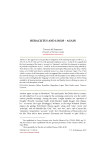
Статья научная
The paper has as its goal the investigation of the meaning of logos in DK frs. 1, 2, 31b, 39, 45, 50, 87, 108, and 115, with particular emphasis on frs. 1, 2 and 50. It is argued that the focal meaning of the term is ‘account’ or ‘statement’, and that the statement in question, of particular importance in frs 1, 2 and 50, it the account/statement forever being uttered by ‘that which is wise’, ( to sophon ), Heraclitus’ divine principle. Plato picks up the idea, with his notion of a World Soul which is similarly forever in a state of utterance (‘ legei ’, Tim. 37ab) which is a piece of self-description, and it is suggested that a modern version of the notion of the universe being in an everlasting state of such self-description is our ability to learn what it has to say by investigating the ‘language’ of radio waves and the like, which are forever being emitted by all moving systems composing the real, and thereby forever offering us a piece of the real’s self-description of itself.
Бесплатно
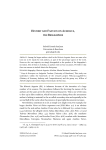
History and Fantasy on Acholius, the Biographer
Статья научная
Among the bogus authors cited in the Historia Augusta, there are some who turn out to be masks for real authors, as part of the picaresque aspect of the work. However, the vast majority are simply disregarded as the product of the biographer’s invention. One of them is Acholius, an author cited on four occasions. We believe that there are reasons to include him in the first group.
Бесплатно
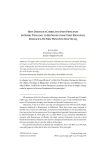
Статья научная
This paper offers a detailed analysis of Damascius' discourse on Orphic theology in Chapter 123 of On First Principles, focusing on how Damascius correlates the first principles of Rhapsodic and Hieronyman theogonies to his own Neoplatonic first principles. Through detailed textual analysis, it presents a schematic alignment of Damascian principles with Orphic theology.
Бесплатно

How Souls Communicate in Hades (Proclus, In Rep. II.163.18-168.26)
Статья научная
In the Myth of Er in the Republic Plato describes various aspects of the soul’s afterlife. At 614e3-615a4 he writes that souls who have gathered on the plain of judgment are then divided into those who lived morally good lives and so rise into a place of reward and those who have not who descend into the realm of punishment. On the souls’ return to the plain after their time above or below, they greet one another and tell each other of their experiences. Some 700 years later, Proclus in his commentary on the Republic tries to answer some issues that this short passage must have raised for some philosophers in antiquity. The problem is simple enough: how can souls who do not have bodies or organs of sense communicate in this way? Proclus lays out his response in several stages. He agrees, of course, that souls in the underworld do not have corporeal bodies. However, they do have ethereal vehicles, and these vehicles, he says, are more closely adapted to the souls and therefore less likely to introduce errors in the souls. Thus, the seeing and hearing in Hades is actually clearer and more directly known than those that occur when we are imprisoned in our bodies. These vehicles retain the images received when we were embodied, and thus we can recognize other souls and communicate with them. As for hearing and speaking, the vehicles are actually better at these tasks than the organs in our bodies. How Proclus reaches these conclusions is not immediately clear from the Republic commentary, but with the aid of other works, especially the Timaeus commentary, we will be able to see how Proclus attempts to make the case for disembodied souls speaking and hearing in the underworld.
Бесплатно
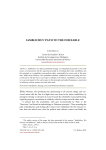
Iamblichus path to the ineffable
Статья научная
Iamblichus of Chalcis postulated theurgy on metaphysical grounds as the only means of communion with the supreme principle of everything that exists. Iamblichus sets this principle as a completely transcendent reality, unattainable by reason, and, at the same time, differs from Plotinus, who postulated absolute withdrawal from everything and conceived union with the One as an escape in solitude to the solitary. Iamblichus conceives matter as an instrument for the souls ascent to that principle and explicitly proposes a mysticism of solidarity with the cosmos and with other souls.
Бесплатно
Iconography of Plato in antiquity and in medieval orthodox painting
Статья научная
The article is devoted to the topic of visualization, which is relevant for the modern world in general and scientific knowledge in particular, investigated through the image of Plato in Antiquity and in medieval Orthodox painting. Using the example of Plato’s iconography as a visual message, the authors want to show the great potential for the development of the visual history of philosophy, anthropology and culture in general, as well as the new visually oriented semiotics and semantics of the image. This approach reveals expressively and meaningfully its relevance for the study of Plato’s image, together with other ancient philosophers’ images, in Orthodox medieval churches in Greece, Serbia, Romania, Bulgaria and, of course, ancient Russia in the 15th-17th cc, allowing to see the great ancient Greek philosopher from a new perspective.
Бесплатно
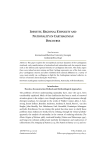
Identity, regional ethnicity and nationality in Carthaginian discourse
Статья научная
This paper explores the sociopolitical and state dynamics of the Carthaginian statehood, early manifestations of nationhood and nationalism and also unpacks issues such as the identity and regional ethnicity in Carthaginian discourse. This study argues there were indeed ancient nations and that Carthage represents one of the best examples. Carthaginian citizens and allies exhibited their national affiliation in a variety of ways, most notably via a willingness to fight for the Carthaginian national collective in the face of extreme duress during the Punic Wars.
Бесплатно
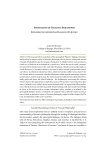
Intimations of Socratic Philosophy. Exploring the Apocryphal Dialogue: On Justice
Статья научная
This essay providers an analysis of the apocryphal “Platonic” dialogue On Justice and develops a unique notion of Socratic philosophy that is present within this ancient example of Sokratikoi Logoi but requires elucidation. It unfolds in three main sections focused on: (1) Dialectic as an example of a “speech-act,” where the use of words “commits” Socrates and his interlocutors to the task of developing an ethical soul in and through reasoned discourse; (2) Socrates’ embrace of a form of ethics termed “practical-and-contextual ethics, as related to eudaimonic ethics, which reveals that unlike “action-based” ethics, Socratic ethics is concerned with ethical behavior within specific and unique contexts and situations, indeed, in great part, the many situations within Socrates finds himself actually guide and direct his ethical behavior - the deliberation concerning the virtuous choices made at the appropriate or right time; and (3) The question concerning how ignorance is related to the ethical choices made in praxis, and it is argued that following Socrates, ethical decisions are indeed possible despite lacking a full and complete knowledge of virtue or the virtues such as courage, temperance, piety, wisdom, or as related to the apocryphal dialogue, “justice.” Ultimately, the analysis seeks to offer the reader an intimation of what an authentic notion of Socratic philosophy might look like despite the Platonic inauthenticity of the source material.
Бесплатно
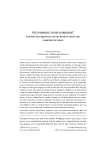
Is it possible to see darkness? Goethe and Aristotle on the role of light and darkness in vision
Статья научная
J.W. Goethe in his Farbenlehre deduced all physical colors from a simple primordial phenomenon that takes place every time light and darkness act through a semi-transparent colorless medium either on our eyes or on the opposite surfaces. This basic rule of Goethe’s color theory was criticized by his contemporary physicists, who argued that darkness could not play an active role in the origin of colors because of being a mere absence of light. The paper demonstrates that this criticism became possible only if one shares the Newtonian view on the nature of light and darkness. Goethe however held a more traditional point of view, which he traced back to Antiquity and Aristotle. In contrast to Newton and his followers, previous scientists considered light not as an immediate cause of colors but as an actually transparent medium that conveyed colors from the visible objects to the organ of sight. For vision to take place, the color must first affect the light, which in its turn, must affect the faculty of vision. Though it is difficult to say what kind of change the light undergoes when some colored object is seen through it, most Aristotle commentators agree that this change must be real and not mere relational. In Aristotle’s physics, however, things that are capable of acting on and being affected by one another are either contraries or consist of contraries. Therefore, to be visible the color must be either dark or to contain darkness. Thus, assuming that Goethe shared the Aristotelian concept of light, we have to conclude that he was not mistaken saying that darkness "acts” upon our eyes or “is seen through” the illuminated semi-transparent medium.
Бесплатно

Is lion-headed man orphic Chronos?
Статья научная
This paper discusses the identification of god figure depicted as a man with a lion's head, which has been associated with Aion and equated with Orphic god Chronos. The author challenges the equation of Aion with Orphic Chronos, drawing on evidence from Proclus and Damascius, who both distinguish Aion as a separate entity from Chronos. Additionally, the author presents an attempt to illustrate the Orphic god Chronos based on Damascius' description.
Бесплатно
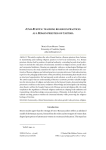
Iunia Rustica: teaching religious practices as a Roman priestess of Cartima
Статья научная
This article explores the role of Iunia Rustica, a Roman priestess from Cartima, in transmitting and teaching religious practices to her local community. As a Roman priestess, Rustica held a position of spiritual authority, extending beyond ritual performance to include the education of community members in religious norms, moral values and ceremonial traditions. Drawing on epigraphic evidence, archaeological findings and historical sources, the study examines the ways in which her role contributed to the continuity of Roman religious and cultural practices in provincial towns. Particular attention is given to the pedagogical dimension of her priesthood, demonstrating that rituals served as structured opportunities for learning and social cohesion, as well as acts of devotion. The article argues that an understanding of Rustica's activities provides valuable insight into the intersection of religion and education in the Roman Empire, demonstrating that priestesses could act as educators, mediators of knowledge and moral guides. By situating Iunia Rustica within the broader framework of Roman provincial religious life, the study emphasizes the significance of female religious authority in shaping local traditions and transmitting cultural knowledge across generations. Ultimately, it sheds light on how ritualized teaching practices reinforced communal identity while preserving the religious heritage of Cartima.
Бесплатно

